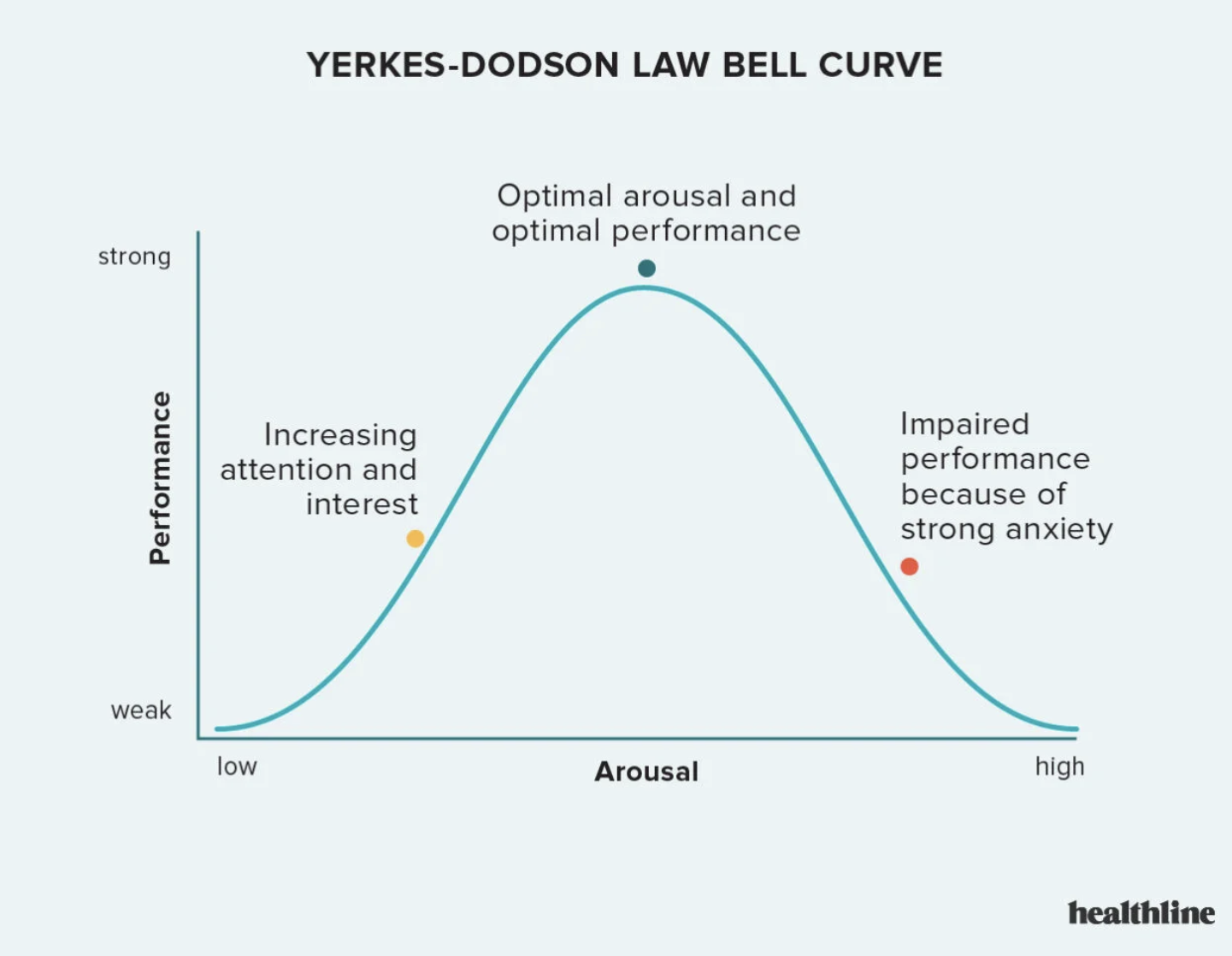6 Ways To Reduce Stress Right Now
You can see here that there is a point when stress level is optimal for performance, but once it passes that threshold, performance starts to decline. Therefore, very low or very high levels of stress tend to have a negative impact on performance.
Stress is an everyday part of life, but somehow we’re always trying to avoid it. Stress can be helpful sometimes though, especially when we have tasks to complete, or perhaps to meet a deadline and we need that little extra push. Some stress is normal, but when stress is prolonged or prevents us from being able to complete those tasks, leave the house, or enjoy our lives, then it becomes a problem. Here is a simple chart illustrating how stress levels are associated with performance.
So how do we get to that optimal level of arousal/stress level so that we can still perform in our day-to-day tasks and activities? We learn stress management techniques and we practice, practice, practice until it’s a part of our lives. Let’s take a look at 6 Stress Management Techniques that can help you feel better today.
Regular exercise
Increase those endorphins and flush out the excess cortisol (stress hormone)! We hear it all the time that exercise does the body good, and it really does! It also does the brain good too. Exercise doesn’t have to mean an intense circuit workout or a spin class (although, good for you if you do this!), but even a 20-minute walk (to the store, to the park, etc.) can improve your mood and decrease stress levels.
sLEEP HYGIENE
Sleep hygiene? Yep. This may look like reducing caffeine intake, no screen time before bed, having a bedtime routine, aiming for 7-9 hours, etc. There are many suggestions that can help you sleep better, which in turn, can improve your overall mood. Ever had a bad night’s sleep and felt really cranky the next day? Starting your day with a good night’s sleep can really have an impact on your mood and your stress levels for the rest of your day. Also, a sleep hygiene blog post is underway!
NOURISH YOUR BODY
Eat well, be well. Healthy foods are great, but simply making sure you eat something on a regular basis throughout the day is enough to reduce stress. Sometimes sitting down and enjoying a nice meal mindfully can really help reduce stress and help us focus on the present rather than other things that are going on.
CONNECT WITH OTHERS
How many times have we thought about a friend or a family member throughout the week but never got around to contacting them? It can be hard to reach out to others when life gets so busy, but this is a great time to send that short message to say “Hey, I’ve been thinking about you. How’ve you been?” Who knows, it’s likely that they had been thinking about you too and were glad to hear from you.
RELAXATION TECHNIQUES
Relaxation techniques are key to reducing stress! My clients find them to be so helpful when we practice in session. Common ones that I enjoy are deep breathing, progressive muscle relaxation (PMR), and visualization/imagery.
Check out my blog post on deep breathing, which is also known as paced breathing, boxed breathing or diaphragm breathing. It includes breathing slowly in from the nose, and then out from the nose or mouth, while engaging your diaphragm.
Progressive Muscle Relaxation: Involves purposely tensing up a group of muscles (e.g., shrugging the shoulders) and then releasing them. The idea behind this technique is to exaggerate the tension for a few seconds and when you release it, pay attention to the difference and how your body feels. Try it a few times with different areas of your body where you feel the most tension.
Finally, Visualization or Imagery involves breathing at a regular pace, closing your eyes and imagining a safe and comfortable place. A place that gives you a sense of peace or joy. Then pay attention to all the senses that comes with being in that place and notice how it makes you feel. While imagining this place, feel the calm that surrounds you and continue to breathe.
A separate blog post on relaxation techniques will be coming soon!
SEEK HELP FROM A PROFESSIONAL THERAPIST
Sometimes even after trying various techniques, it might still be helpful to talk it out with a professional about some things that are overwhelming you. If you’re noticing an increase of unhelpful thoughts and you are having trouble resolving the issues on your own, seeing a therapist can help you learn some new strategies to deal with them. Reach out today to start making some positive changes in your life.
**Want to see more posts on your favourite topics? Leave a comment and let me know what interests you!**

